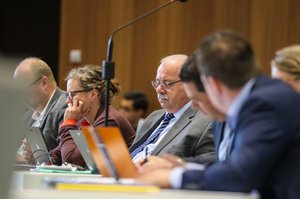The work of the parliamentary groups

Unity is strength – and it reduces the workload too


The right of MPs to form parliamentary groups is based on Article 19 of the Constitution of Lower Saxony. A parliamentary group is a coalition of MPs who generally belong to the same party and form a parliamentary alliance. Uniting in this way helps the individual elected representatives to carry out their parliamentary duties effectively. The constitution clearly states that MPs are solely subject to their conscience. And yet in Parliament, everything comes down to securing majorities to pass proposals. The many interests of individual MPs are debated and considered within the parliamentary groups, so that common ground can eventually be found. In this way the parliamentary groups make an essential contribution to reconciling the free mandate and the requirement for majorities. The more unified a parliamentary group appears, the more effectively it can achieve its objectives.
The parliamentary groups also sit on the expert committees set up by the State Parliament and prepare the political decision-making process. They receive allowances from the parliamentary budget to pay office or specialist personnel, for example. In this way members of a parliamentary group receive better material and staffing support than those who are not part of a group. The rights to table motions and vote in the committees are also usually linked to parliamentary group status. Large parliamentary groups in particular make it easier for their members to divide work and knowledge as effectively as possible. Responsibility for political issues can be split into as much detail as possible, and the experts keep their group up to date with their topic.
Each parliamentary group has a chairperson and a whip. The chair of the group can be described as the group’s ‘political face’. The whip essentially manages the group. The group chair and whip lead the parliamentary alliance in the same way as a conductor and leader of an orchestra.
The members of the parliamentary group that belong to a committee form a working group. They report on their deliberations during group meetings, thus shaping political decision-making on specialist issues within the group, and are responsible for directing the group’s approach in their respective committee.
Majorities in Parliament can result in three different categories of group:
- one governing party alone has a parliamentary majority. It appoints and supports the government.
- Coalition groups can only form a parliamentary majority if they come together. They sign a coalition agreement and appoint and support the government together.
- Opposition parties are in the parliamentary minority and form the opposition to the government majority.
Party discipline
A democratic requirement
The party whip encourages members of a parliamentary group to cast a block vote in Parliament. For good reason: in narrow majorities just a single vote can be the difference between political success and failure. And even in clear majorities, MPs are forced to compromise, as Parliament cannot be successful without a majority. In order to achieve this necessary unity, the group first has to engage in an intense internal debate to reach a common position. However, it is common in votes on important matters of conscience to diverge from the party line.
In contradiction to a free mandate?
The constitution ensures that MPs do not have to abide by any orders or instructions. MPs can invoke this right at any time, even with regard to their own parliamentary group. However, it is political common sense for a parliamentary alliance to act in unison in order to secure majorities that make decisions and action possible. The democratic principle is dependent on majorities. Party discipline is an essential requirement for this. This does not mean that parties do not engage in long and fierce internal debates over the position they adopt – even delegates from the same party sometimes have very differing opinions.
Discipline, not force
The public often see party discipline as party coercion by an aggressively overbearing whip, i.e. illegal political pressure. And of course sometimes MPs only fall into line with gritted teeth, when they cannot get their own way in differences of opinion. But essentially each MP willingly toes the party line – simply because it makes political sense. However, it also makes political sense to release party members from the party line in votes on certain sensitive matters. For example, the parliamentary groups in the Bundestag agreed to allow MPs to vote freely on moving the German Parliament and government from Bonn to Berlin. In Lower Saxony, MPs in the State Parliament were given a free vote on whether the preamble to the Constitution of Lower Saxony should contain any reference to God, for example.
Funding of the parliamentary groups

Parliamentary groups have a legal right to receive funding to be able to fulfil their political parliamentary functions. In accordance with the provisions of the Members of the State Parliament of Lower Saxony Act, they receive monthly allowances from the parliamentary budget to cover their general needs – such as paying staff. The money must not be used for party objectives, but solely for parliamentary work. The parliamentary groups must keep meticulous accounts of their revenue and expenditure. The independent State Audit Office audits the annual balances of the parliamentary groups and makes sure that the allowances are used in accordance with the regulations. The parliamentary groups must make their accounts available to the public. The annual balance sheets are also published by the State Parliament. In short: the State Parliament pays – and asks for a receipt.
The State Parliament decides on the amount of the allowances each year. Its decision is based on a proposal by the President, which in turn is based on a hearing from all the parliamentary groups. The proposal takes into account the general price trend and the wage agreement in the public sector. Currently the allowance consists of a basic monthly amount of €63,089 and an additional monthly amount of €9,463 for parliamentary groups who do not hold state government. €2,366 is added to the basic amount for every member of the parliamentary group as well as another €519 per member for parliamentary groups that do not hold state government.
